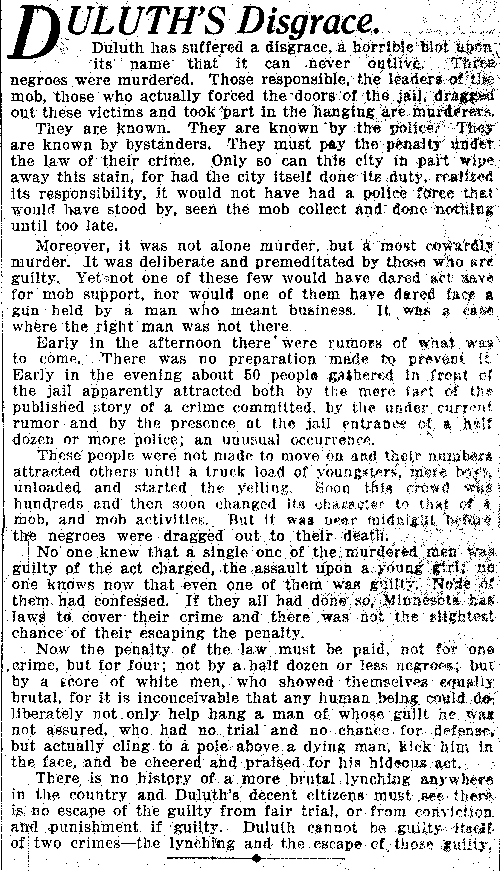Duluth's Disgrace.
Type of event: Lynchings
Location: Duluth; St. Louis County; Minnesota; United States
Citation:
Duluth News Tribune, June 17, 1920, page 1.
“Duluth’s Disgrace”
Image text
EDITORIAL
Devoted to Public Service; In City, State and
Nation
DULUTH’S Disgrace.
Duluth has suffered a
disgrace, a horrible blot upon its name that it can never outlive. Three negroes
were murdered. Those responsible, the leaders of the mob, those who actually
forced the doors of the jail, dragged out these victims and took part in the
hanging are murderers.
They are known. They are known by the police. They
are known by bystanders. They must pay the penalty under the law of their crime.
Only so can this city in part wipe away this stain, for had the city itself done
its duty, realized its responsibility, it would not have had a police force that
would have stood by, seen the mob collect and done nothing until too
late.
Moreover, it was not alone murder, but a most cowardly murder. It was
deliberate and premeditated by those who are guilty. Yet not one of these few
would have dared act save for mob support, nor would one of them have dared face
a gun held by a man who meant business. It was a case where the right man was
not there.
Early in the afternoon there were rumors of what was to come.
There was no preparation made to prevent it. Early in the evening about 50
people gathered in front of the jail apparently attracted both by the mere fact
of the published story of a crime committed, by the under current rumor and by
the presence at the jail entrance of a half dozen or more police; an unusual
occurrence.
These people were not made to move on and their numbers
attracted others until a truck load of youngsters, mere boys, unloaded and
started the yelling. Soon this crowd was hundreds and then soon changed its
character to that of a mob, and mob activities. But it was near midnight before
the negroes were dragged out to their death.
No one knew that a single one
of the murdered men was guilty of the act charged, the assault upon a young
girl; no one knows now that even one of them was guilty. None of them had
confessed. If they all had done so, Minnesota has laws to cover their crime and
there was not the slightest chance of their escaping penalty.
Now the
penalty of the law must be paid, not for one crime, but for four; not by a half
dozen or less negroes; but by a score of white men, who showed themselves
equally brutal, for it is inconceivable that any human being could deliberately
not only help hand a man of whose guilt he was not assured, who had no trial and
no chance for defense, but actually cling to a pole above a dying man, kick him
in the face, and be cheered and praised for his hideous act.
There is no
history of a more brutal lynching anywhere in the country and Duluth’s
decent citizens must see there is no escape of the guilty from fair trial, or
from conviction and punishment if guilty. Duluth cannot be guilty itself of two
crimes—the lynching and the escape of those guilty.

